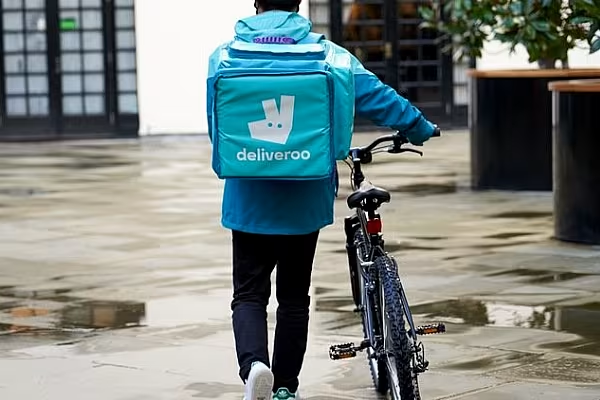Does London’s biggest listing in a decade represent value for money? Tech and finance expert Dmytro Spilka explores this in more detail.
Deliveroo is anticipating that its upcoming IPO will lead to a valuation of up to £8.8.billion (€10.3 billion) – approximately £1 billion more than initially forecasted. This would make it the biggest London Stock Exchange debut since Glencore nearly a decade ago.
But will the initial public offering represent a value purchase for investors?
Founder of the tech-driven delivery service, Will Shu, is expected to cash in 6.7 million shares, worth a total of £30 million, when the company arrives on the stock market on 7 April. Shu will retain a 6.3% stake in the company, worth approximately £550 million.
Existing shareholders, including Amazon and private equity firms Bridgepoint, Index and Greenoak will cash shares worth £536 million, as detailed by the group’s prospectus which was published in late March.
Delivery Demand
Deliveroo has said in a trading update that has continued to benefit from the boom in takeaway delivery demand following the COVID-19 outbreak and ongoing lockdown across the UK.
Notably, the total value of transactions processed on its platform surged by 130% year-on-year in January 2021 in the UK and Ireland, and 112% across other markets. The overall growth across all markets stood at 121% for the period.
The company also confirmed that its IPO will be priced between £3.90 and £4.60 per share. This range values the business between £7.6 billion and £8.8 billion, but will this lead to profits or losses in the midst of what some commentators are calling a tech IPO bubble?
Early Investors Stand To Win Big
At a glance, it’s hard to see how early institutional investors like Amazon won’t be the biggest benefactors from the listing. The tech giants hold an 11.5% stake in Deliveroo which will amount to around £1 billion depending on how the initial pricing of the company fares.
Currently, Amazon holds 15.8% of Deliveroo shares but plans to sell up a portion prior to the delivery company going public for between £90.8 million and £107.2 million depending on pricing.
Elsewhere, Index Ventures, which had also backed the likes of Facebook and Slack, currently holds 10.2% of share capital - a level of equity that would be worth £641 million if Deliveroo prices at the mid-range upon launch.
DST Global, which has already backed UK firms like fintech company Checkout, holds little over 10% of Deliveroo shares, a stake that may be worth £632 million at the time of IPO.
While early investors appear set to make healthy profits on their respective investments ahead of the initial public offering, what can those buying into the IPO itself expect? Let’s weigh up how the Deliveroo listing could manifest itself:
Buying Into a Bubble
Jim Armitage, city editor for the Evening Standard, has recently written about his hesitancy when faced with the prospect of a Deliveroo IPO.
Despite Deliveroo’s exciting technology, evident growth and relatively strong reputation in a market that’s plagued by the mistreatment of delivery drivers, Armitage expressed his disappointment at the size of the valuation in the wake of ballooning tech IPO prices.
Expressing his scepticism, Armitage said, “Digital companies’ IPO valuations have been getting crazier by the week. Alongside the SPACs phenomenon in the US, it’s feeling like a late 1990s bubble. [...] If Deliveroo was alone in its market and had built an impregnable “moat” around it like Airbnb, you could see the argument.”
This touches on another problem that Deliveroo faces: the lack of a sustainable competitive advantage at this stage. The takeaway food market is fairly crowded across the world, with many big companies like Uber Eats, DoorDash and Just Eat among industry leaders.
Bill Blain, strategist at Shard Capital claimed that “in a market with room for maybe two competitors, Deliveroo is at number three,” and the risk is that in a low-margin business, the winner boils down to who can spend the most on developing a practical and dominant network of delivery staff, restaurants and customers.
However, it’s also worth noting that Deliveroo has moved quickly in announcing some ambitious expansion plans to supplement its IPO - including building infrastructure in 100 new towns across the UK and expanding into grocery delivery markets over the course of the year.
Ultimately, success could be down to the support that Deliveroo wins in its customer base - all of whom could be granted access to Deliveroo’s IPO.
Participating In Deliveroo’s IPO
If you’re planning to have a shot at the Deliveroo IPO, the company plans to make £50 million worth of shares available to private investors. To be eligible, you’ll need to have a Deliveroo account and to have ordered at least one takeaway with them in the past.
You’ll be invited to register your interest in taking part in the IPO and prospective investors have the ability to apply to buy up to £1,000 worth of shares in multiples of £250 via Deliveroo’s IPO partner, Primary Bid.
Despite this, there are plenty of opportunities for retail investors who haven’t used the Deliveroo platform to get involved in the IPO. For example, Freedom24 offers IPO participation for listings to the general public - including Deliveroo’s IPO. However, there’s an application process attached and a threshold of at least £2,000 is required to participate.
Other more traditional brokers like TD Ameritrade and Fidelity also offer IPOs for users, although the threshold is typically higher. With TD Ameritrade, users are required to hold at least $250,000 in account value while Fidelity requires at least $100,000 to $500,000 in household assets.
However, retail investors will be able to access Deliveroo shares when trading begins on the London Stock Exchange in the coming days. While there’s plenty of room for growth, the spotlight will be on the fortunes of London’s biggest listing for nearly 10 years.
About the Author: Dmytro Spilka is a tech and finance writer based in London. He is the founder of Solvid and Predicto, and his work has been published in Investing.com, IBM, FXStreet, Entrepreneur and FXEmpire.
© 2021 European Supermarket Magazine – your source for the latest retail news. Article by Dmytro Spilka. Click subscribe to sign up to ESM: The European Supermarket Magazine.














